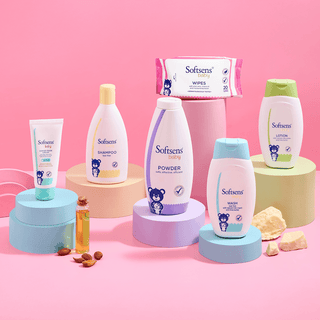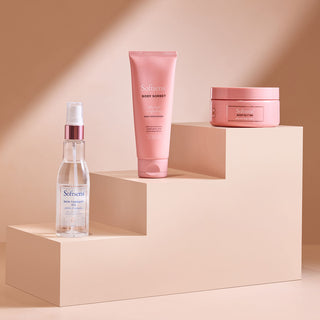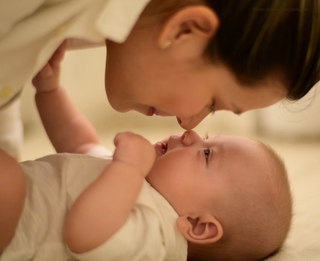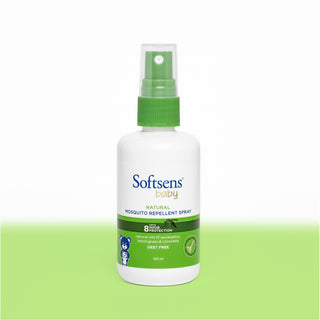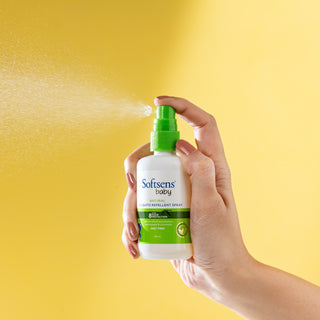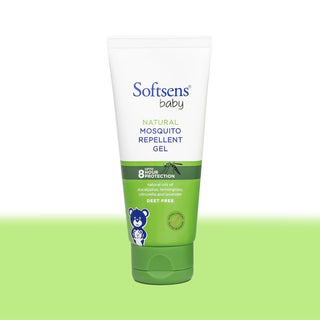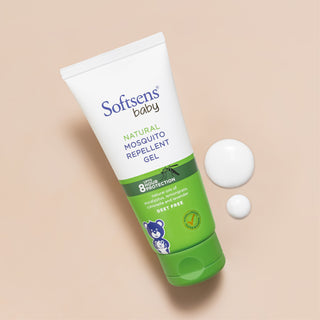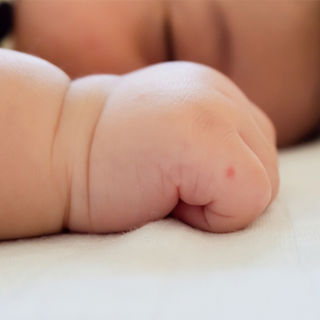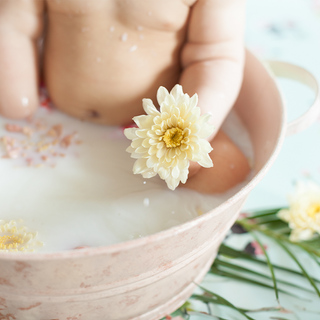
The pitter-patter of rain against the windowpane might signal the arrival of a refreshing monsoon season, but it also brings unwanted visitors – mosquitoes. These pesky insects can turn a fun family outing into a symphony of itchy bites and potential discomfort for your little one. Protecting your baby's delicate skin from these buzzing annoyances becomes a top priority. But when it comes to mosquito repellents, the options can be overwhelming. Should you whip up a DIY concoction or reach for the store-bought brands? Let's dive in and explore the pros and cons of each to help you make an informed decision to protect your baby’s delicate skin. In this guide, we’ll explore the following points to help you choose the right mosquito repellent for your baby.
- Understanding Mosquito Repellents
- DIY Mosquito Repellent: Pros & Cons
- Store-Bought Mosquito Repellents: Pros & Cons
- How to Choose the Perfect Mosquito Repellent for Baby
- What makes the Softsens Baby Natural DEET-free Mosquito Repellent Range Perfect for Baby?
- Additional Tips for Protecting Your Baby from Mosquitoes
- Finding the Perfect Balance between DIY & Store-bought
Understanding Mosquito Repellents
Before diving into the DIY vs. store-bought debate, it's important to understand how mosquito repellents work. These products create a barrier between your baby's delicate skin and hungry mosquitoes. Some repellents mask your baby's natural scent, making it harder for mosquitoes to locate them, while others actively repel mosquitoes with certain chemicals.
DIY Mosquito Repellent: Natural Protection

- Pros of DIY Mosquito Repellents:
- Natural Ingredients: DIY repellents use essential oils like citronella, lemon eucalyptus, or lavender, which are considered safer for babies than some synthetic chemicals.
- Cost-Effective: Many DIY recipes use readily available ingredients, making them a budget-friendly option.
- Customizable: You can tailor the scent and strength of a DIY repellent to your preference.
However, before diving into DIY territory, let's consider some crucial drawbacks:
- Cons of DIY Mosquito Repellents:
- Less Research: The effectiveness of DIY repellents can vary, as they often lack the rigorous testing that commercial products undergo.
- Safety Concerns: Essential oils, though natural, can irritate a baby's delicate skin. Always patch test before full application
- Undetermined Concentration: It's difficult to measure the exact concentration of active ingredients in DIY repellents, potentially leading to inconsistent protection.
- Application Frequency: Frequent reapplication may be needed with DIY repellents, increasing the risk of skin irritation for babies.
Store-Bought Mosquito Repellents: Tested & Proven

Store-bought mosquito repellents have undergone rigorous testing to ensure their safety and effectiveness. Commercially available mosquito repellents offer a number of advantages over DIY concoctions.
- Pros of Store-Bought Mosquito Repellents
- Proven Effectiveness: Reputable brands undergo rigorous testing to ensure the safety and effectiveness of their products.
- Longer Lasting: Store-bought repellents typically provide protection for several hours.
-
Convenient: They are readily available in various forms for easy application.
- Cons of Store-Bought Mosquito Repellents:
- Chemical Ingredients: Some parents are concerned about the potential effects of ingredients like DEET, especially on young children.
- Cost: Commercial repellents can be more expensive than DIY options.
- Strong Scent: The smell of some store-bought repellents can be overpowering.
How to Choose the Perfect Mosquito Repellent for Baby
- Read Labels Carefully: If choosing a store-bought repellent, look for those specifically formulated for babies and children. Avoid products containing DEET for infants.
- Consider Natural Options: If you prefer a natural route, choose DIY repellents with ingredients known to be safe and effective for babies (e.g., citronella, lemon eucalyptus).
- Patch Test: Always test a small amount of any repellent on your baby's skin before full application to check for irritation.
- Reapply as Needed: Follow the instructions on the product label for reapplication frequency.
What Makes the Softsens Baby Natural DEET-Free Mosquito Repellent Range Perfect for Baby?
We know that your baby’s delicate skin deserves only the safest, gentlest ingredients. So, we designed a range of natural and DEET-free mosquito repelling essentials that are perfectly safe for your little ones. Protect your baby’s skin from mosquito bites for up to 8 hours with our Natural Mosquito Repellent Gel, Spray or Fabric Roll-on. Use our Natural After-bite Recovery Roll-on to instantly reduce swelling, itching or discomfort caused by mosquito or bug bites. Here are some more reasons why our natural, DEET-free mosquito repellent range is perfect for you baby.
- Enriched with the power of natural essential oils
- DEET-free formula that’s safe for infants
- Hypoallergenic and tested in Europe
- Ayush-certified and FDA-approved
- PETA-certified Cruelty-free and Vegan

Additional Tips for Protecting Your Baby from Mosquitoes
Don’t forget these essential tips to protect baby from nasty mosquito bites.
- Dress in Protective Clothing: Cover your baby's arms and legs with lightweight clothing.
- Use Mosquito Nets: Cover strollers and cribs with mosquito netting.
- Avoid Peak Mosquito Hours: Mosquitoes are most active at dawn and dusk.
- Remove Standing Water: Mosquitoes breed in stagnant water, so eliminate any sources around your home.
Finding the Perfect Balance Between DIY & Store-bought
The best mosquito repellent for your baby is the one that you feel most comfortable using. Whether you choose a DIY or store-bought option, prioritize safety and effectiveness. By taking the necessary precautions, you can ensure your little one enjoys a monsoon that’s free of itchy bites and potential mosquito-borne illnesses.



